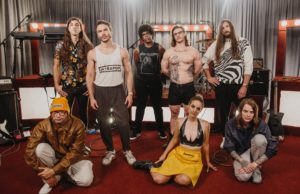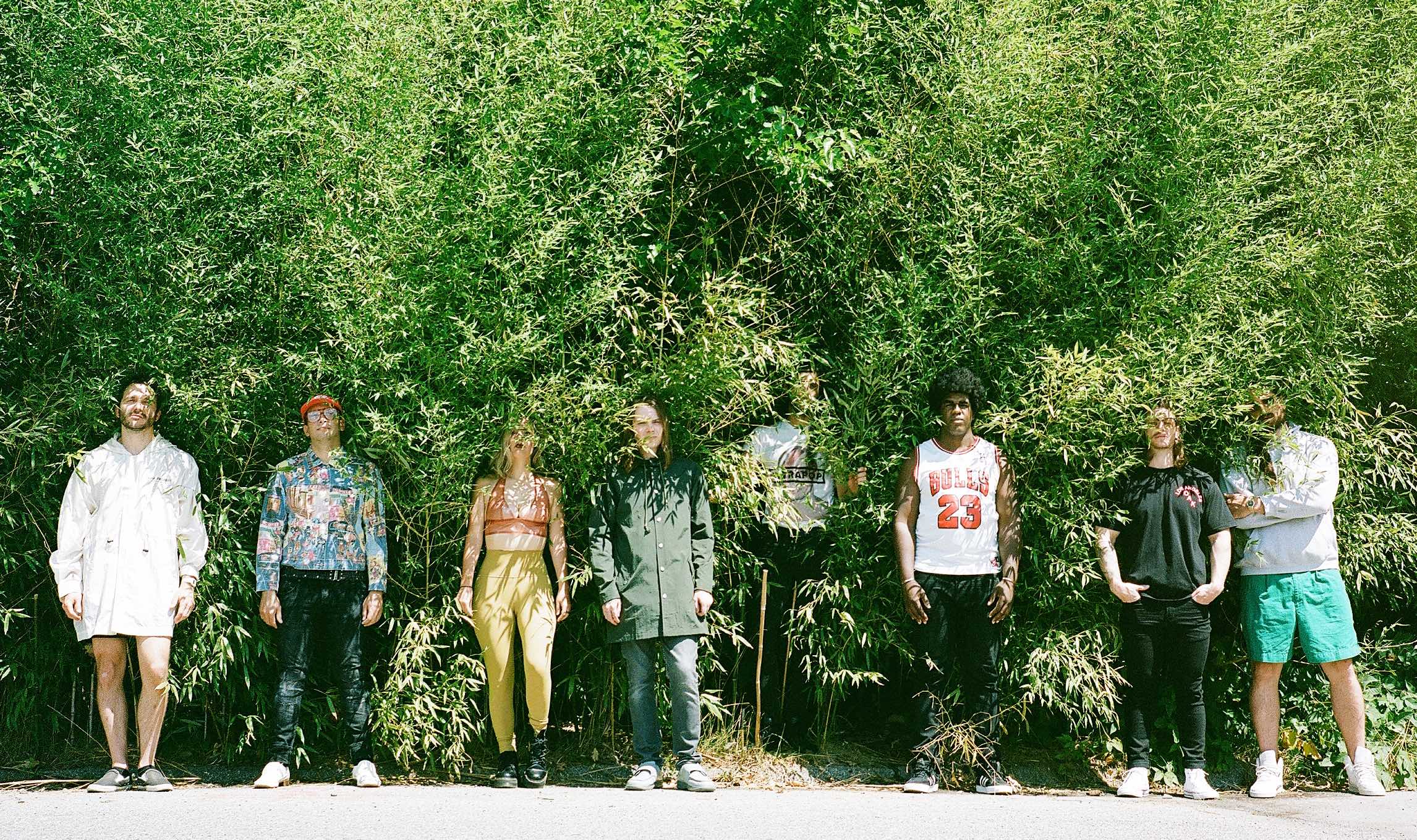For a band that’s only three albums into their career, The Armed are certainly carrying a lot of baggage. There’s plenty of fascinating literature about the group spread across the internet, none of which The Armed—who’ve always existed somewhere on a spectrum of anonymity—has really had much to do with beyond a little light instigation. The narrative surrounding the album cycle for 2018’s Only Love notably featured stolen Frank Turner recordings, a music video starring Tommy Wiseau, and a truly surreal profile in VICE that could easily be adapted into an HBO miniseries. Logically, in the age of Q, rampant conspiracy theories were soon to follow.
“In the beginning, the idea was to create an art project that was divorced from authorship,” Armed mouthpiece Adam Vallely earnestly tells me over the phone, explaining that anonymity simply allowed for more creative freedom among the group’s 26 (give or take) performers. What wasn’t meant to rouse suspicion, he claims, led to the inception of the NDA-core collective we know today, whose failure to employ MF DOOM’s casual hidden identity led to fans hypothesizing that they’re actually, say, the product of an ad agency. “We’re not like Slipknot or something, we don’t wanna wear masks—our goal is to just try to deter people from focusing on an identity, and then it almost completely backfired for us and became a thing to be solved. Our whole thing is that it doesn’t matter. If you figure it out, it’s not important to what we’re trying to present.”
What they’re trying to present has its own complicated backstory. The cleanest description I can muster for this group is noise rock via glitchcore with a mission statement of intentionally ruffling the neckbeards of every hardcore purist their music manages to reach. Hitting play on one of their records without context feels a lot like flipping through channels and landing on Adult Swim—it exists so far outside the realm of its medium’s conventions that you’re immediately at sea. In fact, even context won’t help beyond the fact that the Detroit-spawned collective’s name, like that of Eric Andre or Tim Heidecker, warns you that whatever audio and/or visual experience it’s attached to will be utterly bizarre and totally unique. Their live shows only feature a fraction of the full collective (“There’s literally six different people playing bass on this record,” Vallely tells me), though there are still enough guitarists on stage to induce fond memories of Fang Island and Diarrhea Planet.
Before the release of their latest LP ULTRAPOP, I pegged them as a veritable Polyphonic Spree of hardcore vets fed up with the genre’s conventions, overly serious demeanor, and tired gatekeeping, making them the ideal band for someone like me who shares their taste in music, but just cannot seem to use the term “grindcore” correctly. “I think that’s one interpretation,” Vallely says when I present my theory that the common denominator in the band is a fear of backlash due to their love of synth-heavy pop music. “We’re just trying to scratch an itch that we don’t think is being scratched, which is the intensity of hardcore but with the technique of other art forms. If you like music that’s maximal and gets your heart pumping and makes you wanna go nuts, it just seems like you’re stuck with masculine yelling and certain types of chords—a lot of form that’s very prescriptive that you have to stick to. And it just seems like the exact opposite of something that’s supposed to be rebellious or subversive. It’s comical, at this point. They’re fetishizing stuff that’s decades old.”
“If you like music that gets your heart pumping and makes you wanna go nuts, it just seems like you’re stuck with masculine yelling and certain types of chords—a lot of form that’s very prescriptive that you have to stick to. And it just seems like the exact opposite of something that’s supposed to be rebellious or subversive.”
Not that The Armed aren’t comical—there are several moments on ULTRAPOP that are so over-the-top that they border on laugh-out-loud funny before they dial it back down again (say, one too many pitch changes, or five too many guitars overlapped). “If you’re aware of what you’re doing, I don’t think that’s a problem,” Vallely shares. “I think you can be a very serious artist who uses whimsy and confusion to overwhelm.” Pressing the issue, Vallely cites their capacity for humor as an important factor in their complex, constantly evolving musical formula that ultimately strives to serve as an antidote for a dying genre they love. “It’s important that someone’s trying to do something to broaden the scope of an art form. We have a love of hardcore, we have a love of these extreme genres—and that’s why we’re trying to break them. So that they can live and subsist, not just be some sort of stagnant joke thing on the side. Not be the ‘psychobilly’ or whatever.”

With ULTRAPOP proving to be the band’s first press cycle that at least openly involves reasonable human names attached to the project (a “Dan Greene,” whom Vallely constantly cites as a sort of brain behind The Armed, is also credited with being a core member, and Greene and less-reasonably-named keyboardist/pro bodybuilder “Clark Huge” have also been conducting interviews) and press photos that are consistent with the figures featured in their music videos, it feels like the needle’s moving in The Armed’s longstanding reputation as a mystery to be solved first and a band to be listened to second. The album feels too devoted to breaking down the last remaining walls of genre to really put too much effort into furthering their campaign against artist bios and “About” pages—where Only Love felt like a hardcore record flirting with unabashed pop music, ULTRAPOP feels like the inverse.
“From the beginning we felt like we’d had this successful experiment where we’d tried to take the vocabulary of the pop music we loved and some lesser known pop music from our youth—which we grasped onto when we were too young to know it wasn’t cool—and we tried to apply it to our framework of The Armed…and I think we were successful,” Vallely explains. “What we wanted to do from the start [of ULTRAPOP] was the inverse—we wanted to instead focus on writing a pop framework for everything, and then putting The Armed vocabulary on top of it. It’s this subtle switch, and it sounds like art school bullshit, but it really isn’t—it was the guiding light for all of it.”
Put a little less eloquently, and in the form of a question, “Can we make an album that’s a sell-out album just because we want to, but that’s just as good as anything else we’ve made, and hopefully much, much more mature and much better?”
In the age of hyperpop—an acknowledged cousin to ULTRAPOP, though a category Vallely wouldn’t say ULTRAPOP quite falls into—the answer is a resounding, pitched-up “yes.” Where Only Love opened with a split second of frantic electronics before descending fully into the band’s warped take on destructive, screaming hardcore, ULTRAPOP opens with slow bass pulses, glistening electronic accompaniment, and calm falsetto vocals. “We wanted to be very, very upfront,” Vallely continues. “We wanted to draw a line in the sand really early that’s like, ‘We’re not being apologetic for what we’re doing.’ There’s a lack of courage in aggressive music, and I think we were actively trying to counterbalance that, saying ‘We know what we’re doing and we don’t really care how you feel about it.’”
“It’s important that someone’s trying to do something to broaden the scope of an art form. We have a love of these extreme genres—and that’s why we’re trying to break them. So that they can live and subsist, not just be some sort of stagnant joke thing on the side.”
There’s something about that opening title track, and even much of the considerably more energetic music that follows, that feels more transparent than we’ve ever heard the band, which helped put my mind at ease ahead of our conversation—regrettably transpiring on April Fools’ Day—after worrying, as many journalists have before me, that I’d be speaking with a paid actor or some other non-Armed entity. To me this album felt like the work of individuals (as opposed to an ambiguous pile of guitars and synths) committing to the project with matching tats. Or, considering how it’s in the band’s DNA to always take things way too far, matching bulging biceps, as the entire group has engaged in “literal bodybuilding” over the past year and change. “We were far beyond committing to the bit, and we are now living the bit indefinitely,” Vallely laughs.
In the same way the band inverted the pop-sound/hardcore-vocabulary frameworks on ULTRAPOP, it also feels like they’ve flipped the public-image/unique-sound-that-stands-on-its-own factors. After being treated to some truly astonishing visuals, surprising cameos, and perplexing workout regimens, what follows is a record that often possesses more courage than anything recently released with a “-core” suffix tag, and a personality more pronounced than that of anyone involved with PC Music. “We hope it speaks for itself,” Vallely says. “I also hope the mystery and everything else can be a further deep-dive for people who really want to go, and provide them some entertainment, too. I think it’s cool—everyone, get into in any way that’s meaningful to you. I just think that it’s less important to solve it, maybe, than to just embrace the confusion.” FL

photo by Aaron Jones









